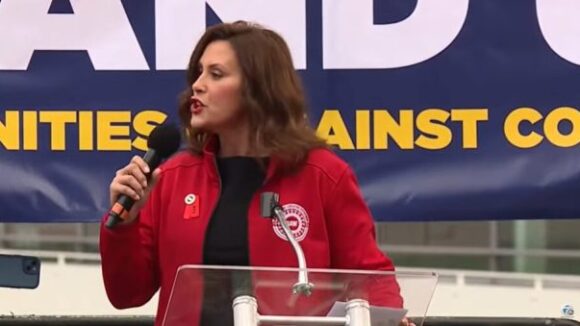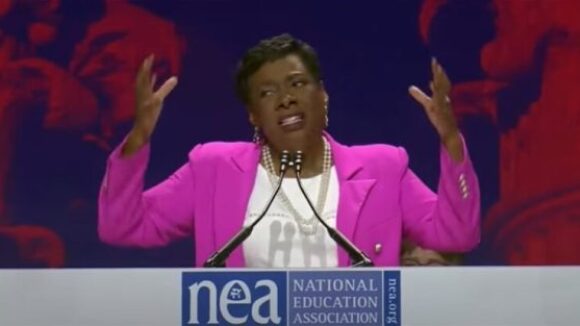Tyranny Triumphs in the Great Lakes State
Ignoring ample evidence of forced unionism’s unfairness and its damaging impact on jobs and incomes, Big Labor Michigan Gov. Gretchen Whitmer signed Right to Work destruction in 2023.
(source: National Right to Work January 2016 Newsletter)
As this Newsletter edition goes to press just a few weeks before the 2016 presidential caucuses and primaries get underway, National Right to Work Committee leaders and members have serious concerns about several of the remaining candidates for the GOP and Democrat presidential nominations.
The good news is that candidates remaining in the race as of the start of this year have responded to their Committee candidate surveys and staked out their position 100% in opposition to compulsory unionism and in favor of a national Right to Work law.
So Far, Donald Trump, Marco Rubio and Ben Carson Are Sitting on the Fence
Among the candidates who have pledged full support for Right to Work is U.S. Sen. Ted Cruz (R-Texas). At press time, he is his party’s frontrunner in the February 1 Iowa caucuses, the first major electoral event in the presidential nominating process.
Unfortunately, none of the three GOP candidates who are, at press time, running second, third, and fourth behind Mr. Cruz in Iowa, according to the famous Real Clear Politics average of polls, has yet to return his Right to Work questionnaire.
“The not-so-good news is that businessman Donald Trump, U.S. Sen. Marco Rubio [Florida], and retired neurosurgeon Ben Carson are, at least for the moment, still sitting on the fence with regard to compulsory unionism,” said Mark Mix, president of the National Right to Work Committee.
“But the presidential caucus and primary season is just getting underway. There’s still time for Mr. Trump, Mr. Rubio, Mr. Carson and a number of other candidates who remain in the race to stand up for the Right to Work.”
Hillary Clinton, Bernie Sanders And Martin O’Malley Vow To Veto Any Right to Work Bill
“The really bad news,” Mr. Mix continued, “concerns several other candidates who are seeking to become America’s next President — former U.S. Sen. Hillary Clinton [N.Y.], Sen. Bernie Sanders [Vt.], and former Gov. Martin O’Malley [Md.].
“Ms. Clinton, Mr. Sanders, and Mr. O’Malley, who are all vying for the Democrat presidential nomination, have already sought to win Big Labor bosses’ support by pledging to VETO a national Right to Work law if it reaches their desk.”
In Late December, Committee Began Mobilizing Supporters In Iowa, New Hampshire
To clarify the intentions of all the announced candidates seeking the GOP and Democrat presidential nominations, last fall the Committee mailed questionnaires to their campaigns, asking where the candidates stand on nine key compulsory-unionism-related issues.
And on December 28, the Committee turned up the heat by mailing letters to 192,000 New Hampshire (the first primary state) and Iowa households in which at least one identified Right to Work supporter resides.
The letters mobilized freedom-loving Granite Staters and Hawkeyes to contact the candidates and urge them to take a clear stand against compulsory unionism.
“For decades, polls have shown that the vast majority of Americans who regularly vote in federal elections believe laws and other policies that favor forcing workers to pay union dues or fees as a condition of employment are just plain wrong,” said Mr. Mix.
In Early Presidential Battleground States, Voters Heavily Pro-Right to Work
“And opposition to pro-forced unionism labor policies appears to be especially intense among likely voters in the states where the crucial first contests for the 2016 Republican presidential nomination are taking place,” Mr. Mix added.
He noted that less than two years ago, Iowa state Sen. Joni Ernst (R-Red Oak) unabashedly supported Right to Work as she campaigned successfully to capture a U.S. Senate seat that had previously been held by Big Labor Democrat politician Tom Harkin.
And in November 2015, Ms. Ernst cosponsored S.391, legislation commonly referred to as the National Right to Work Act. It would repeal all the provisions in federal labor law that currently authorize the termination of employees for refusal to pay dues or fees to an unwanted union.
Moreover, surveys conducted for the Committee in late 2011 by respected pollster Kellyanne Conway showed that voters likely to participate in the 2012 presidential ballots in New Hampshire and South Carolina (the second primary state) overwhelmingly agree that federal labor laws should protect the Right to Work.
Ms. Conway’s scientific survey found that 72% of likely Granite State primary voters believe federal law should “definitely not” allow “labor union officials to have a worker fired . . . for not paying union dues or fees.”
An additional 9% said federal law should “probably not” allow that.
In the Palmetto State, the results were even more lopsidedly pro-Right to Work.
An overwhelming 82% of likely South Carolina 2012 primary voters said federal law should “definitely not” sanction forced union dues or fees. Another 4% said “probably not.”
‘Will the Next President Of the United States Stand up to Big Labor?’
Mr. Mix commented: “Ever since he became President in 2009, Barack Obama has eagerly championed Big Labor power grabs in Congress and selected forced-unionism zealots for leadership positions at the National Labor Relations Board [NLRB], the Labor Department, and other federal bureaucracies.
“The Obama Administration’s schemes to expand forced unionism, such as the 2015 decision by three Obama NLRB appointees to ignore the statutory definition of ‘employer’ in order to facilitate the corralling of millions of franchise and contract-company employees into unions, are very unpopular.
“As an alternative to Mr. Obama, freedom-loving Americans of all parties want a President who’s ready to fight for the Right to Work principle. Will the next President stand up to Big Labor?
“Or will he or she spend four years coddling the union bosses, or avoiding confrontation with them because they’re ‘too powerful’ to take on?”
Mr. Mix urged Right to Work members, especially residents of early primary states, to continue intensely lobbying Mr. Trump, Mr. Rubio, and Mr. Carson, along with all the other nonresponsive presidential hopefuls.
It’s worthwhile to keep contacting even candidates who have seemed unsympathetic or openly hostile to Right to Work up to now.
Nominee Who Offers Clear Alternative to Dead-End Obama Agenda Can Win
“I would be overjoyed,” said Mr. Mix, “if all the Republican and Democrat candidates decided, in response to grass-roots activism, to oppose forced unionism in the future, regardless of where they have stood up to now.
“But if it turns out there is only one presidential candidate on the ballot this fall who offers a clear alternative to President Obama’s dead-end agenda of compulsory unionism, I’m confident that candidate can prevail, despite all the forced-dues money the Big Labor political machine will undoubtedly spend.
“And Right to Work members and supporters will have a very positive impact by helping millions of other Americans see how important the Right to Work issue is, and letting them know exactly where the candidates stand.”

Ignoring ample evidence of forced unionism’s unfairness and its damaging impact on jobs and incomes, Big Labor Michigan Gov. Gretchen Whitmer signed Right to Work destruction in 2023.

Largely thanks to the Right to Work attorney-won U.S. Supreme Court decision in Janus v. AFSCME, union bosses like NEA President Becky Pringle are no longer able to block virtually all meaningful education policy reforms.

Avelo employee Kim Howard believes all the firm’s flight attendants should get to vote on continued AFA rule. Credit: WTNH-TV (ABC,…